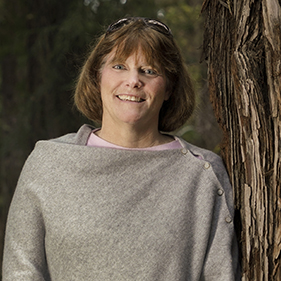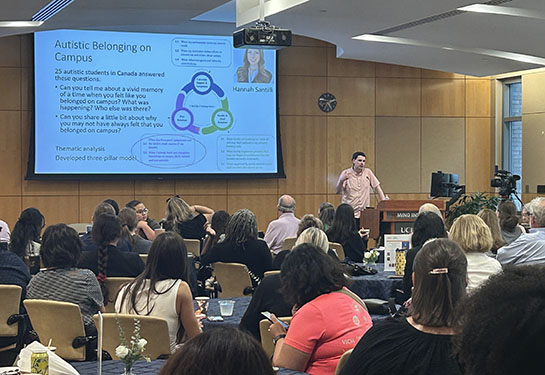UC Davis program for students with intellectual disabilities graduates first class of students
‘I’m emotional and I’m proud’: Redwood SEED Scholars celebrate graduation, jobs and independence
UC Davis’ first-in-California inclusive college program for individuals with intellectual disabilities is celebrating a momentous milestone. The first class of Redwood SEED Scholars has graduated from the four-year, non-degree program.
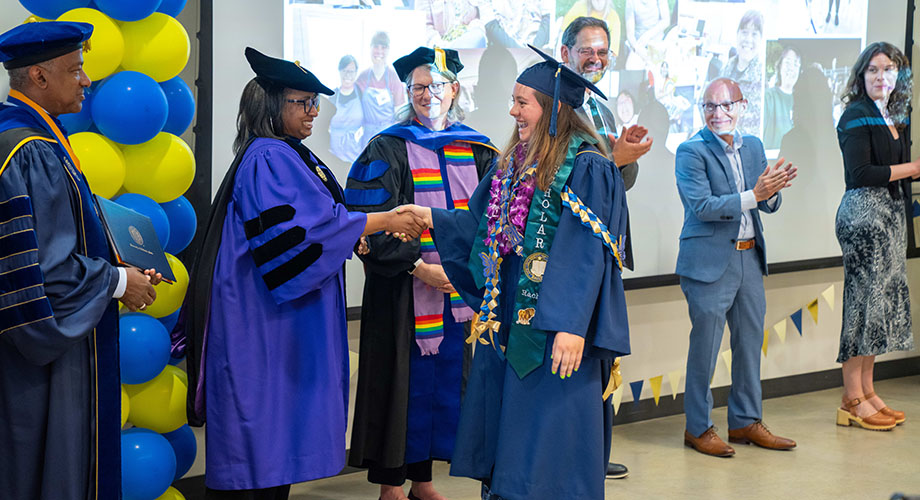
“It’s all sorts of emotions, and hard to believe,” said Olivia Adams-Falconer, one of the eight graduates. “I’ve made so many memories, and I loved the program. It’s been completely life-changing.”
Redwood SEED is managed by UC Davis Continuing and Professional Education, the Office of Diversity, Equity and Inclusion and the UC Davis MIND Institute. Scholars live on campus and take specialized core classes and traditional college courses. About 170 mentors help them with academics, social skills, health and wellness and more.
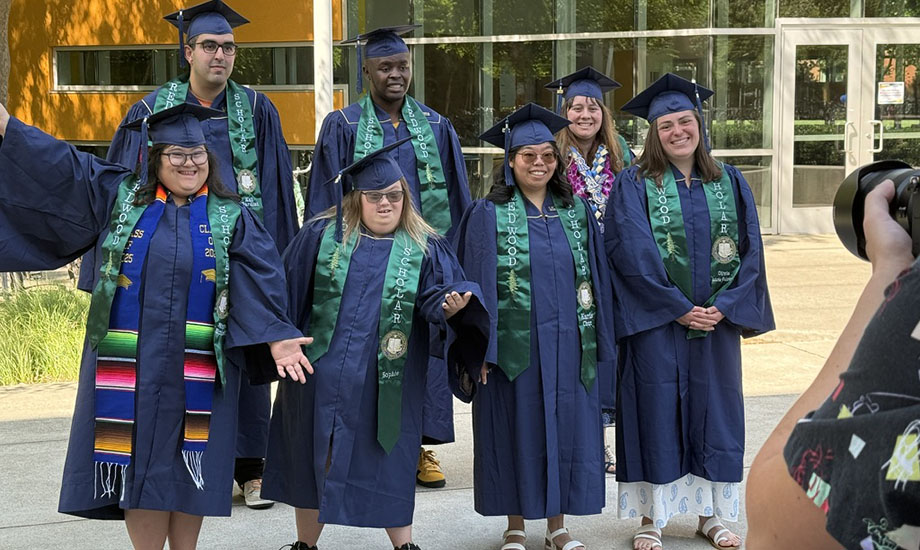
At a recent graduation ceremony, scholars proudly wore UC Davis blue caps and gowns and forest green stoles created by a mentor that featured embroidered redwood trees. They received their credentials, which were approved by Continuing and Professional Education, in front of family and friends.
UC Davis Chancellor Gary S. May, Vice Chancellor for Diversity, Equity and Inclusion Renetta Garrison Tull and Dean of the Division of Continuing and Professional Education Julie Greenwood took part in the ceremony. Director of Access Programs at Continuing and Professional Education Jake Hosier, Distinguished Professor Emeritus of Psychiatry and Behavioral Sciences and former MIND Institute director Leonard Abbeduto and Redwood SEED Employment Director Maddi Hinchey also shook hands with the scholars as they walked to receive their credentials.
“It’s a big, big day,” said scholar Cristina Riegos. “I’m emotional and I’m proud.”
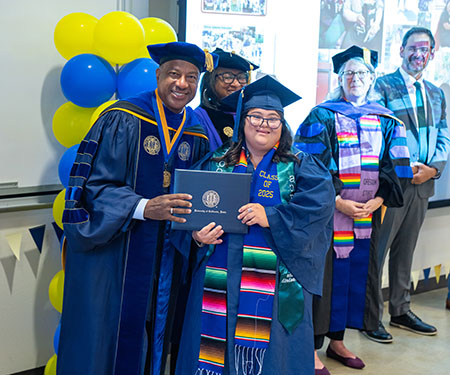
Education builds confidence
“Watching them get so excited for academic learning has been so rewarding,” said Redwood SEED Director Beth Foraker.
Dru Cullison, the literacy instructor for the program, shared that the academic growth the scholars accomplished went far beyond what she expected.
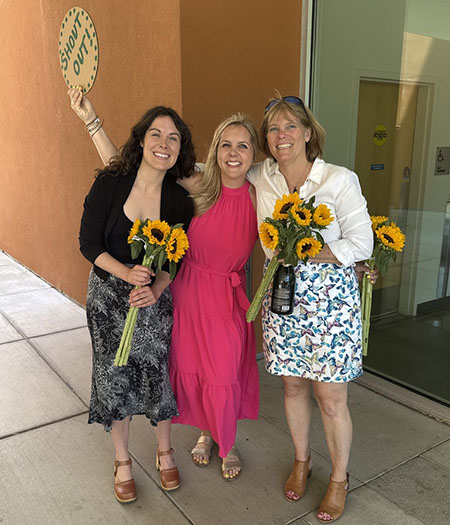
“At the beginning, some scholars said they didn’t really read much. But they did the hard work,” she explained. “They’ve come a long way and are taking lessons learned and applying them to their lives. They’re showing the world what they can do and breaking down those barriers for themselves. We’ve talked all four years about how they’re the ones making the path for the ones behind them.”
There are 27 departments on campus that have welcomed Redwood SEED Scholars into their classes alongside traditional students. Scholars have taken African American Studies, Military Science, Human Development, Drama and more.
“I took a Korean history class because I’m Korean and I wanted to learn something about my own culture,” explained scholar Karis Chun. She also took a Greek Mythology class. “It was something I never thought I would take, but it was fun!”
Scholar Kai Gardizi’s favorite course was one on the history of rock and roll. “I am going to miss that the most,” he said.
It’s not just the scholars, but the other UC Davis students, the professors, the workplaces, the community that’s been impacted, and it keeps rippling. That’s the dream, because what we’re really trying to build is a whole community of belonging, and that’s happening in Davis.” —Beth Foraker, director, Redwood SEED Scholars
Jobs, independence and bright futures
Key goals of the program are employment and independent living, and most of this year’s graduates already have jobs lined up — many in places they worked during the program.
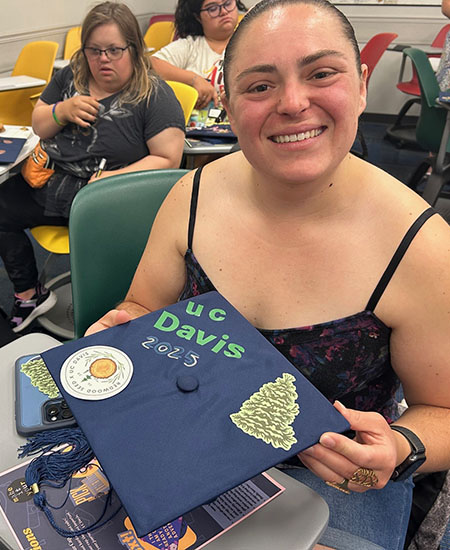
Olivia Adams-Falconer and the other scholars gathered to decorate their caps for graduation.
Chun and Adams-Falconer will return as mentors — members of the Redwood SEED team supporting other scholars. Adams-Falconer has also been hired to continue working in the mail room of the Chemistry Department, where she’s been employed this year.
“UC Davis has done a beautiful job of working with the program and working with the scholars to build a job that they can be successful in,” Foraker said, adding that the program is a model for other universities and businesses.
“To have UC Davis understanding the value that they bring to the workplace tells you that a lot of workplaces are hungry for this opportunity if it’s customized, intentional and with good support built in,” she said.
In fact, several other universities are working with Redwood SEED to try to replicate the program on their campuses.
Scholar Abeer Humayun will continue her work at the UC Davis Scientific Store and Microscope Services after graduation.
“I really like it. I enjoy being independent, talking to my co-workers and working to earn money,” she said.
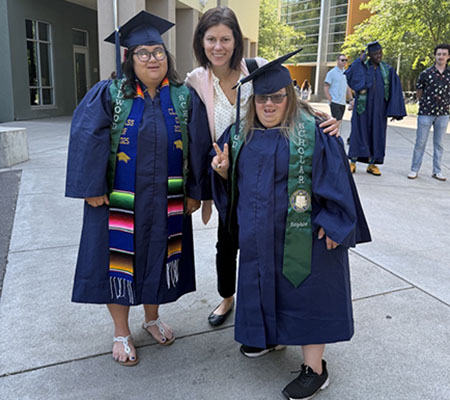
Another scholar, Sophie Howarth, will continue to work in the lab of Associate Professor Nicole Sparapani, a researcher in the Department of Education and the MIND Institute. Howarth will also be a co-author on a research paper about relationship education for adolescents and adults with disabilities.
“It’s actually really fun,” Howarth said, noting that she enjoyed talking with Sparapani about the research.
“Sophie is an asset to our team,” Sparapani said. “Her contributions are important, and her energy is contagious.”
Gardizi hopes to work at the Gap in San Francisco, which he describes as his “main dream.” He has been working in a new position created by the Gap and the Redwood SEED Scholars program in Vacaville.
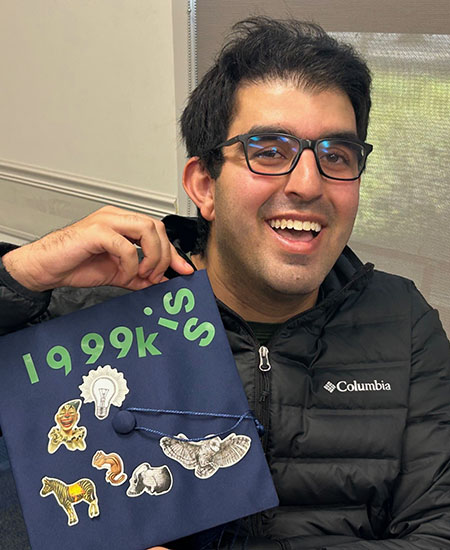
About three-quarters of the scholars plan to stay in Davis. Some will be roommates. They’ll live, work, shop and socialize in the community. Foraker said that’s the transformative power of inclusive college.
“It’s not just the scholars, but the other UC Davis students, the professors, the workplaces, the community that’s been impacted, and it keeps rippling. That’s the dream, because what we’re really trying to build is a whole community of belonging, and that’s happening in Davis,” she said.
For some students, graduating from a UC Davis program was especially poignant. One scholar was joined by his uncle — who is an alumnus of the school — at the ceremony.
Adams-Falconer’s brother graduated from UC Davis more than a decade ago and she had always dreamed of attending the school.
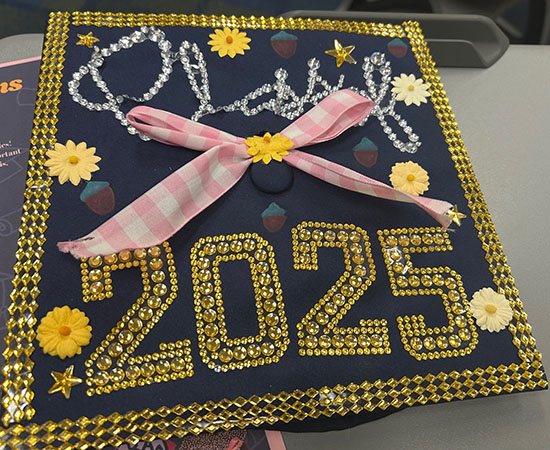
“I’m guessing that he’s really proud of me graduating from here. Since he was the first alumni, now I’m going to be the second alumni, so I find that pretty cool,” she said.
She has advice for other individuals with intellectual disability who are also dreaming big:
“Anything is possible. If anyone has a disability and if they want to go to college — do it! It’s quite amazing.”
About Redwood SEED Scholars
Redwood SEED Scholars is a four-year, on-campus, non-degree program for California students with a diagnosed intellectual disability. It is funded through a U.S. Department of Education grant. Vice Chancellor for Diversity, Equity and Inclusion Renetta Garrison Tull and Distinguished Professor Emeritus Leonard Abbeduto of the MIND Institute are co-principal investigators on the grant.
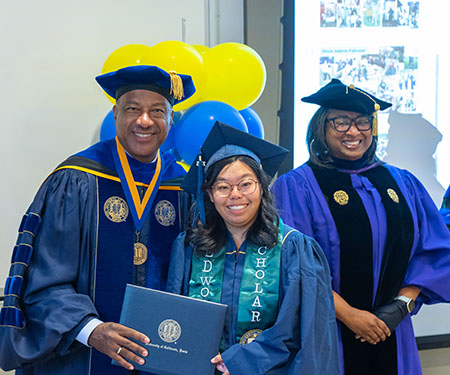
The California Department of Rehabilitation supports the scholars with tuition, transportation and technology. The program is also a vendor with the state of California regional center system, which funds room and board in many cases.
Twelve scholars are accepted each year through an extensive application process. The next application period opens Oct. 1.
The UC Davis MIND Institute in Sacramento, Calif. is a unique, interdisciplinary research, clinical, and education center committed to deepening scientific understanding of autism and other neurodevelopmental conditions. It is a highly collaborative center, bringing together families, researchers, clinicians, community leaders and volunteers with the common goal of developing more personalized, equitable, and scientifically proven systems of support and intervention. The institute has major research efforts in autism, fragile X syndrome, chromosome 22q11.2 deletion syndrome, attention-deficit/hyperactivity disorder (ADHD) and Down syndrome. More information about the institute and its Distinguished Lecturer Series, including previous presentations in this series, is available on the Web at https://health.ucdavis.edu/mind-institute/.

